A Feast for the Heart
Learning about life - and food - from a Greek family in their Cretan farm
Hola and welcome to Where on Planet Earth! In case you got here by accident and are not yet a subscriber, here you go:
Rocks and dust is all I see while I press the accelerator as far as it goes.
"You hit me with a rock!", my husband yells. I am trying to get our toy car out of this little dirt mound it got stuck on. We were trying to get it up a steep hill its motor wasn't made for. “There is no signal here!” he keeps yelling at the wind while pacing outside the car. The sun is unrelenting, nothing but dryness and desolation around us. Google Maps sent us through this “shortcut”, but I sort of encouraged it - “come on, it’s going to be ok, just go” - so this is kind of, possibly, a little bit my fault? I am still undecided. What the heck are we going to do, I think but don't say.
My husband gets behind the car and pushes it while I keep accelerating. The smell of... burnt car? is pretty intense. The excellent Cretan wine from a few bottles we just tasted swirls in my mind. Finally I am free and driving like a madwoman up the hill, my husband left in the dust, literally. I am afraid the impulse won't be enough to get the tiny red Toyota up the almost vertical mountain. But after a couple minutes I see the main paved road; cars zoom by oblivious to the desperation two strangers on a dirt road just experienced.
I wait there for a few minutes. Finally he appears - a halo of dust around him - gets in the car without a word, and we are off. We arrive at the cooking class late, but one smile from Sevi, our Greek host, and I can breathe, I am calm. She leads us into her backyard to a vine-shaded table. We sit and compose ourselves, drink some water, and chat about the food we are about to cook. Then Sevi gives us baskets and leads us towards a dirt path.
"This is a pomegranate tree!", "Here is a walnut one!", "Smell this rosemary!", "Look at these nectarines, grab one!", she exclaims as we walk
I take a nectarine and bite into it, overwhelmed by the incomparable sweetness of eating fruit just picked from a tree.
We keep walking until we arrive to a corral with about six goats. Kri-kri, as they are called, are all over the island. I have seen them standing perilously on craggy rocks overlooking the ocean, always serene, as if they own the place. They are endemic to Crete, so they sort of do. A white small one has a big milk-full udder. Sevi's father, Babi, takes it out of the corral. Babi has golden skin, a white mustache, and a camo shirt. He bents from his waste, grabs the breasts expertly and starts milking them. He gets into a rhythm and a forceful stream of milk goes into a big bucket. He gestures for us to come near.
Everything Babi says to me is in Greek, but he puts his hand a certain way, repeats a word a couple of times while making a push and a pull gesture. I do as I see, and milk flows, filling the bucket to the rim. "Bravo! Bravo!" he excitedly yells. Sevi holds and caresses the goat soothingly throughout, and laughs out loud looking at two other goats playing. Then she picks up and hands me the only baby goat of the herd; it has soft hair and a calm demeanor, as if being rocked by a human - me! - was the most natural thing. Getting stuck on that toy car was worth it, I think.
On the way back to the house we stop by their little garden. Sevi gestures towards a tall grass on the ground, “pull it”, she says and I do, and big beautiful onions emerge. Tomatoes, cucumbers, eggplants, all of it is sun-kissed gorgeous. I feel the urge to take a bite from the tomato as I would an apple. All vegetables taste better here; sweeter, juicier, more intense. I wonder why, the sun? the land? the love?
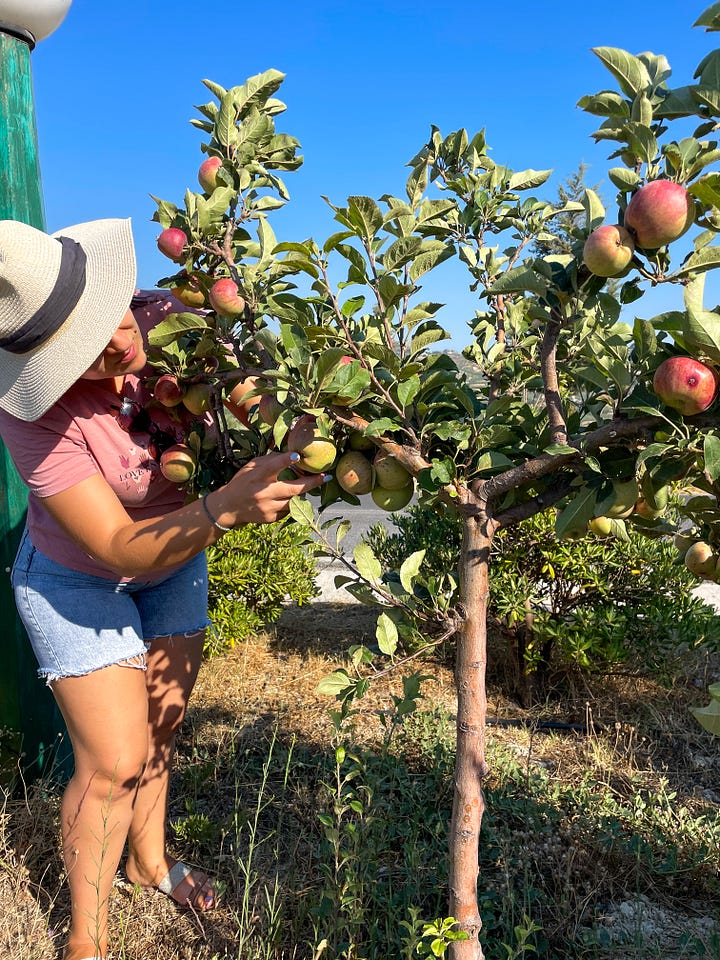
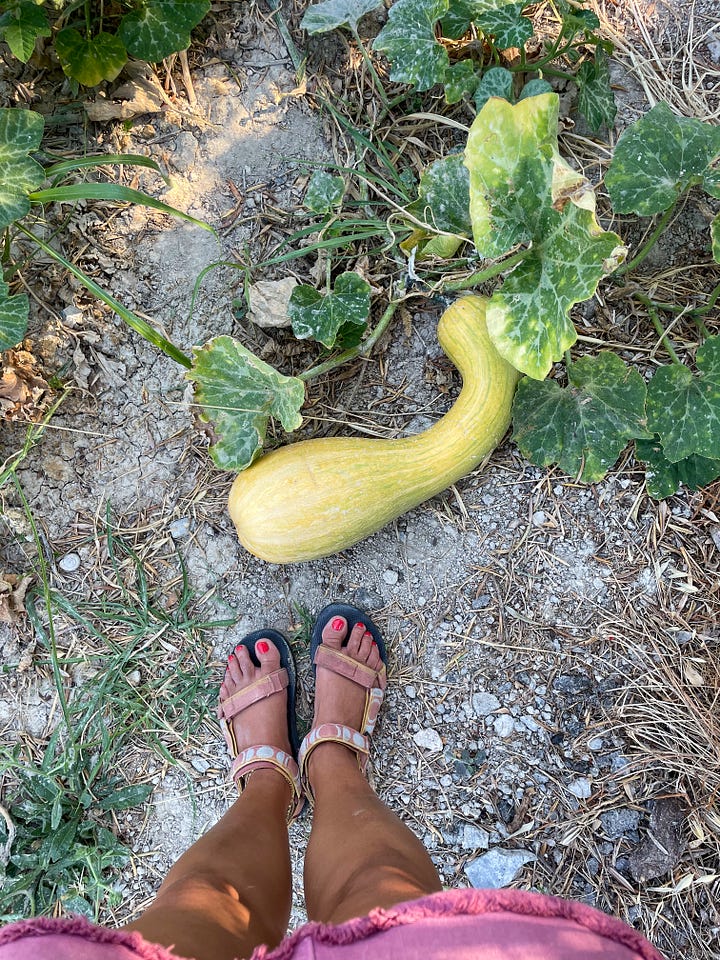
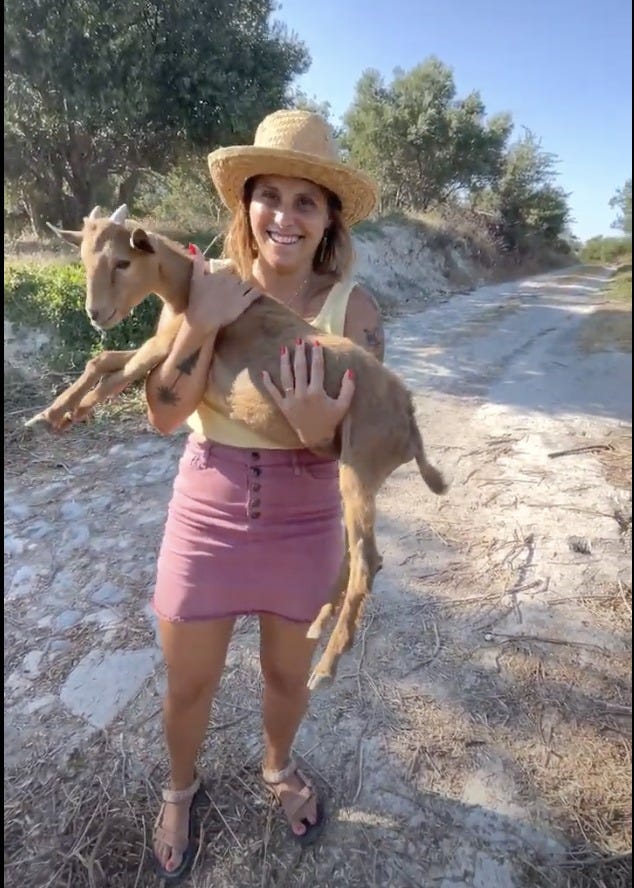

Back at our grape-leaves shaded table we start to cut the onions and grate the tomatoes. We meet Sevi's mom, Katerina, a Greek grandma. She is small and wide, with short thin black hair, small golden loops in her ears, a bit of mustache and beard, and thick eyebrows. She smiles at us, looks at Sevi and says something in Greek. Sevi replies back, and Katerina then turns to us,
“Where are you from?”, she asks
"From Latin America! I am Venezuelan and he is Mexican", I answer her and she nods, smiles, seems surprised in a good way
“I am proud of you mama”, Sevi immediately says, love in her tone, and then to us, “She doesn’t know any English, but she is trying”
We start with the Lamb Giovetsi. We throw onions in excellent local olive oil, then sear the meat and pour grated tomatoes over it.
"I don't eat lamb, or goat", Sevi says nonchalantly while she stirs the pot
“Oh…”, I get out, taken by surprise
Sevi looks at her mom and continues, “Growing up, they were my pets, I loved them. One time my mom cooked goat and told me she had bought it in the supermarket. But when I went to the corral my favorite goat was gone. She tricked me…. I just can’t do it”
Katerina and Sevi look at each other knowingly; no Greek is needed for this exchange, these words have already been spoken, hearts and tears have already been shared.
While the lamb cooks we make a simple Cretan Salad of tomatoes, cucumbers, artichokes, Cretan rusks (like croutons), olives, hard eggs, oregano, and feta. Olive oil and sea salt flow freely. Katerina starts mixing grated tomatoes with herbs and flour to make Tomato Balls. A bit of salt, a handful of mint, some flour - mix mix - a spoonful of oregano, finely chopped onions, a lot of feta, always and forever. With boiling oil in the pan, Katerina grabs a spoonful of the mix and throws it in. It sizzles approvingly. Thirty seconds later she turns the tomato balls - which are really more like pancakes in shape - around. Golden and crispy, I already know this will be my favorite dish.
Babi brings the fresh goat milk, which we boil to clean and then make Rice Pudding with. We put mastiha in it, which is a resin obtained from the mastic tree. It smells like pine, tastes like deep forest - I am transported to the Pacific Northwest, hiking in a thick fog next to giants.
We finish cooking and eat the plentiful and delicious food overlooking the mountains of Crete. As predicted, the tomato balls - crispy, juicy, salty - are my favorite. We cheer with Cretan wine and homemade Raki.
As we drive away Sevi and Katerina stand at the top of the stairs, holding each other and waving goodbye at us with wide smiles. We wave back, and get on the big road with our small car, filled to the rim with gratitude.
Tomato Balls Recipe
Ingredients
3-4 ripe and firm tomatoes, grated or finely chop
1 small onion (finely chopped)
½ bunch of fresh mint (chopped)
1 tbsp. fresh oregano (chopped)
1 tbsp. fresh thyme (chopped)
½ cup feta cheese in crumbs
4-5 tbsp. flour
Olive oil for frying
Salt and pepper
Preparation
Put tomatoes in a bowl.
Add the onions and mix with a spoon
Add the mint, oregano, thyme, and feta, and season with salt and pepper
Stirring little by little, add the flour until you have a thin porridge.
Heat the olive oil and fry spoon by spoon until golden brown, about 2-3min
Leave them on absorbent paper to drain

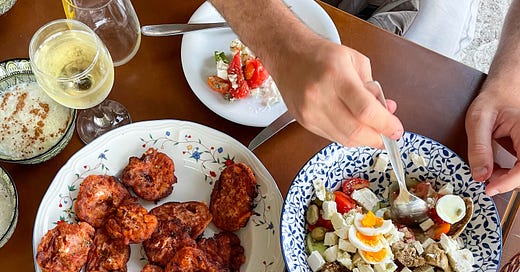



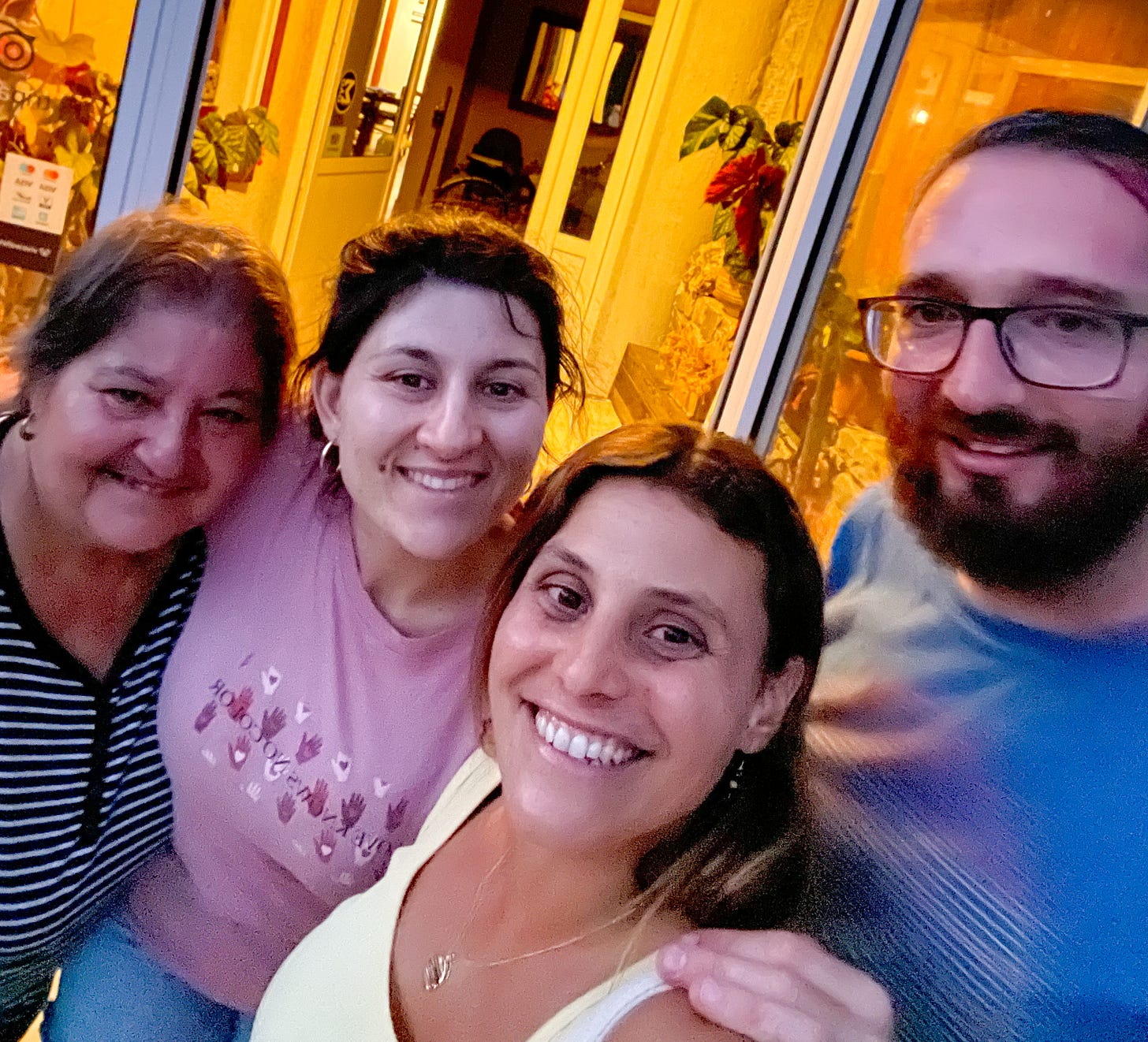
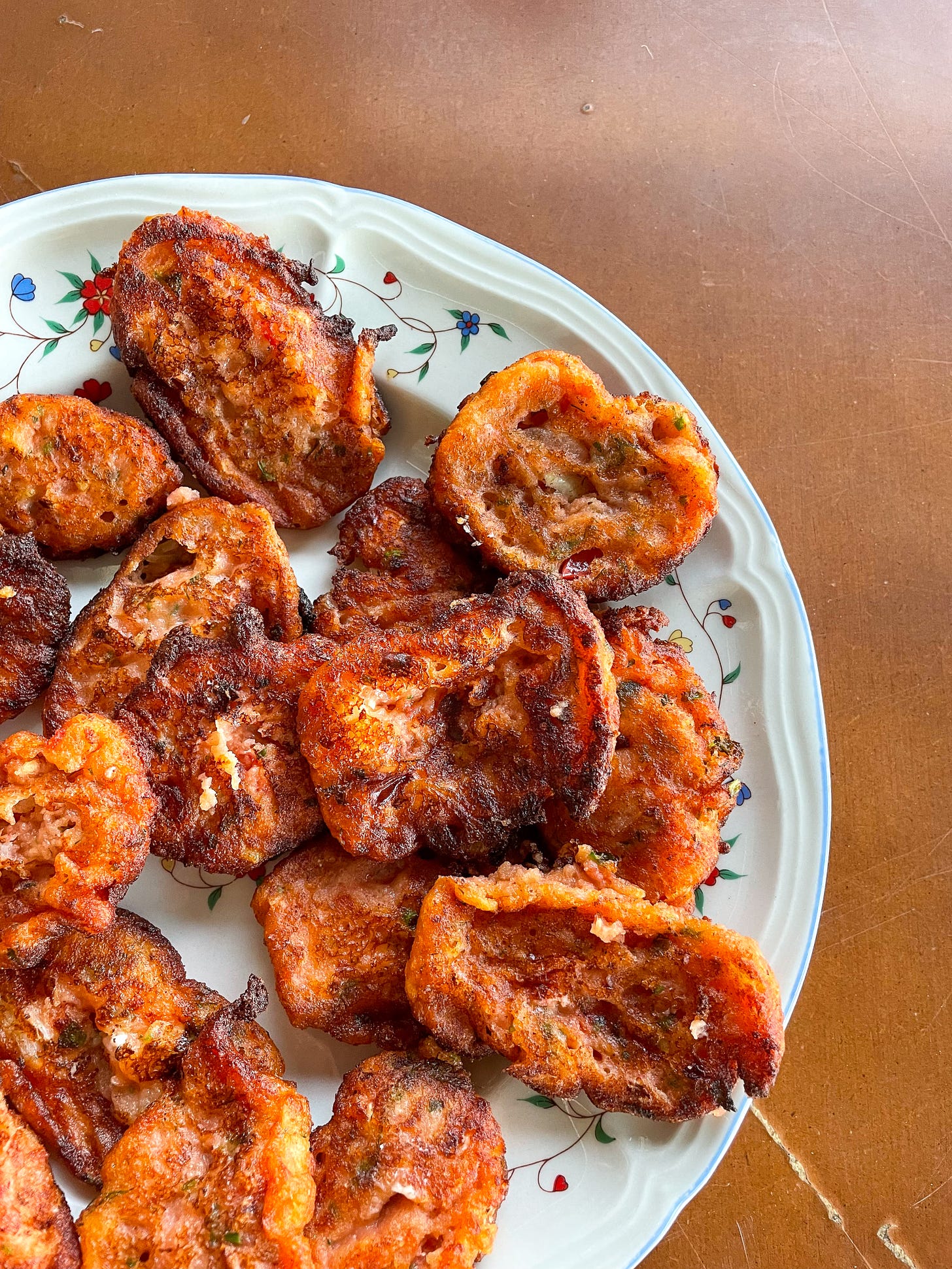
What a beautiful experience. Nothing like meeting the locals and learn from them, their culture, way of life and food.
I love your history.You are a wonderful story teller.